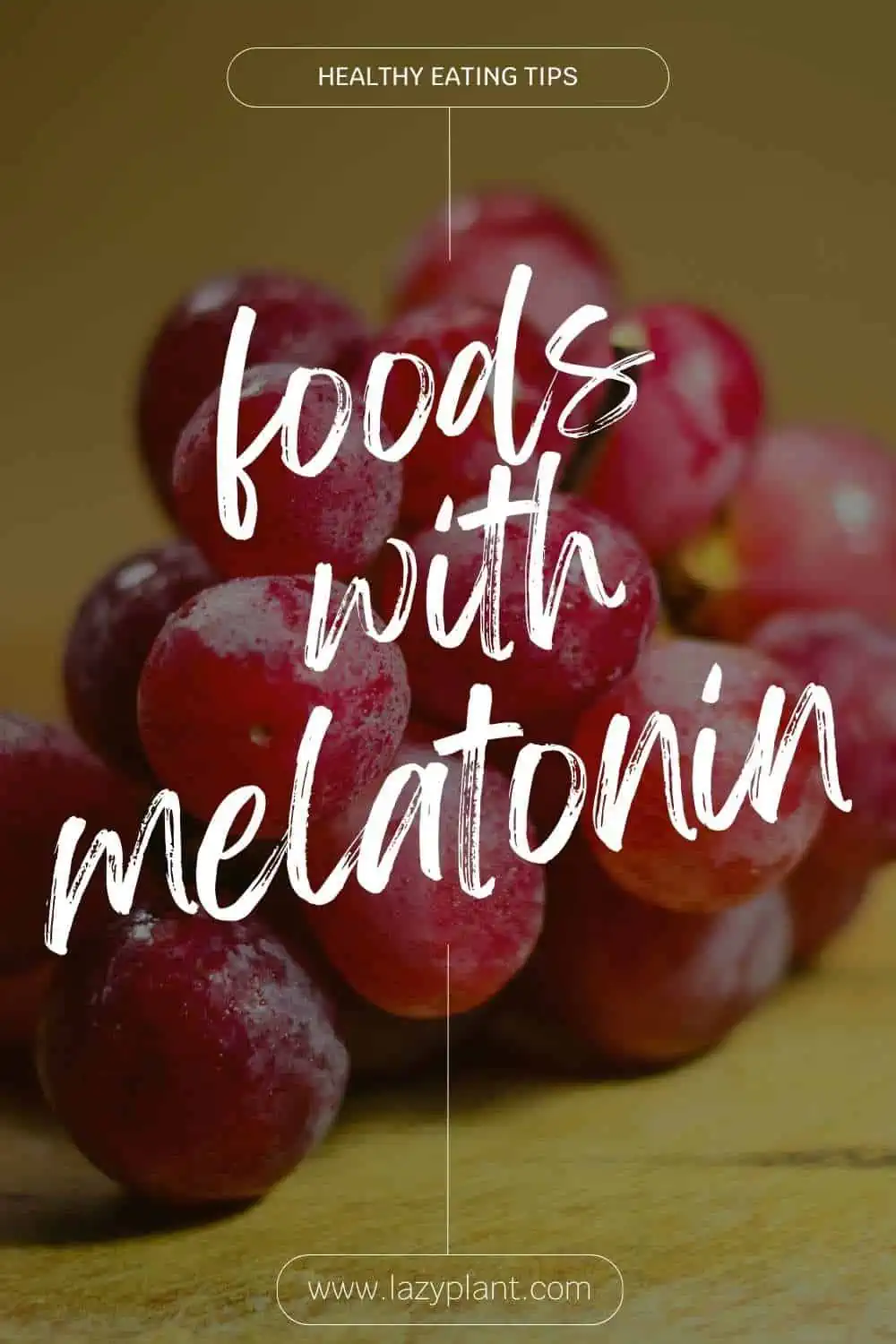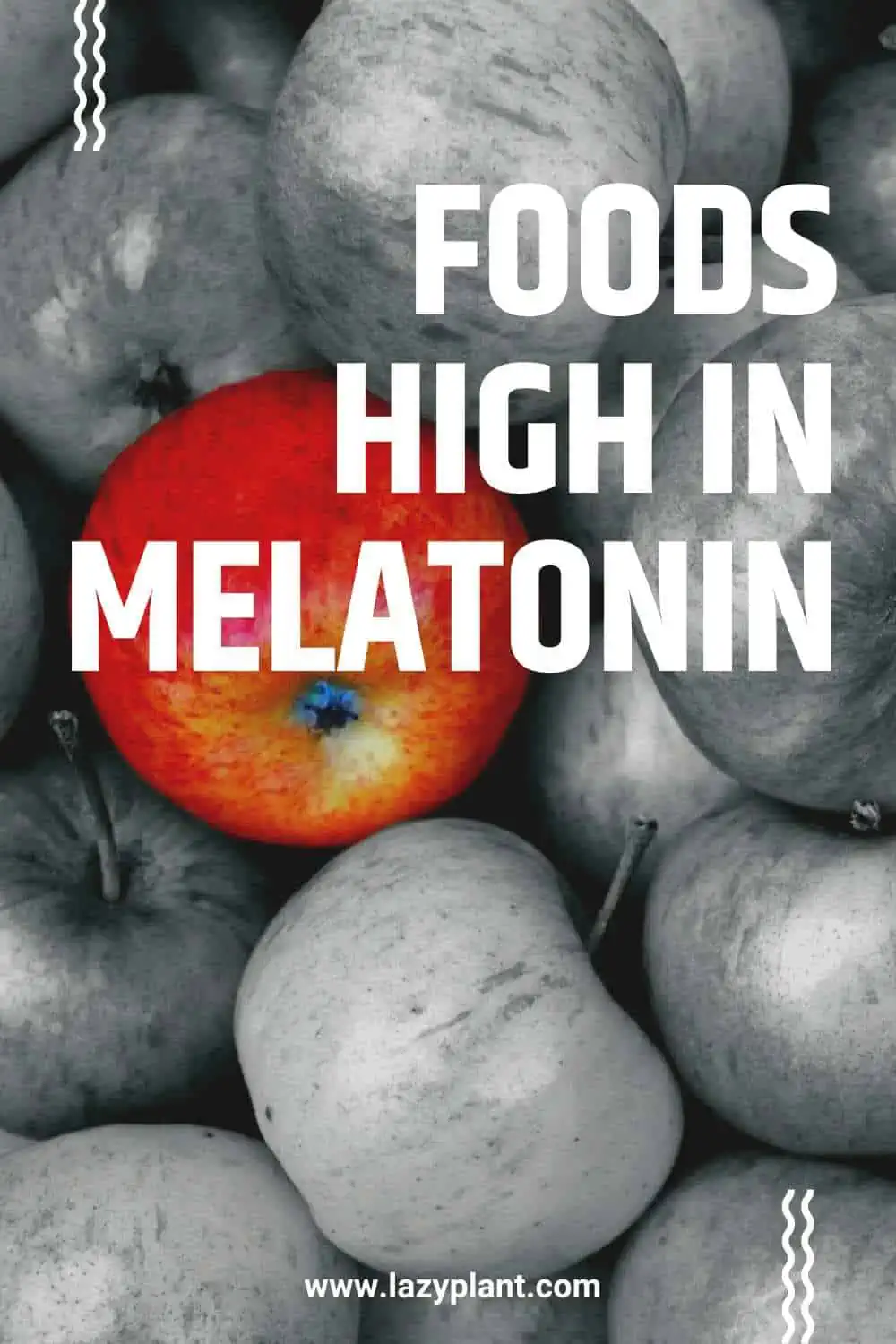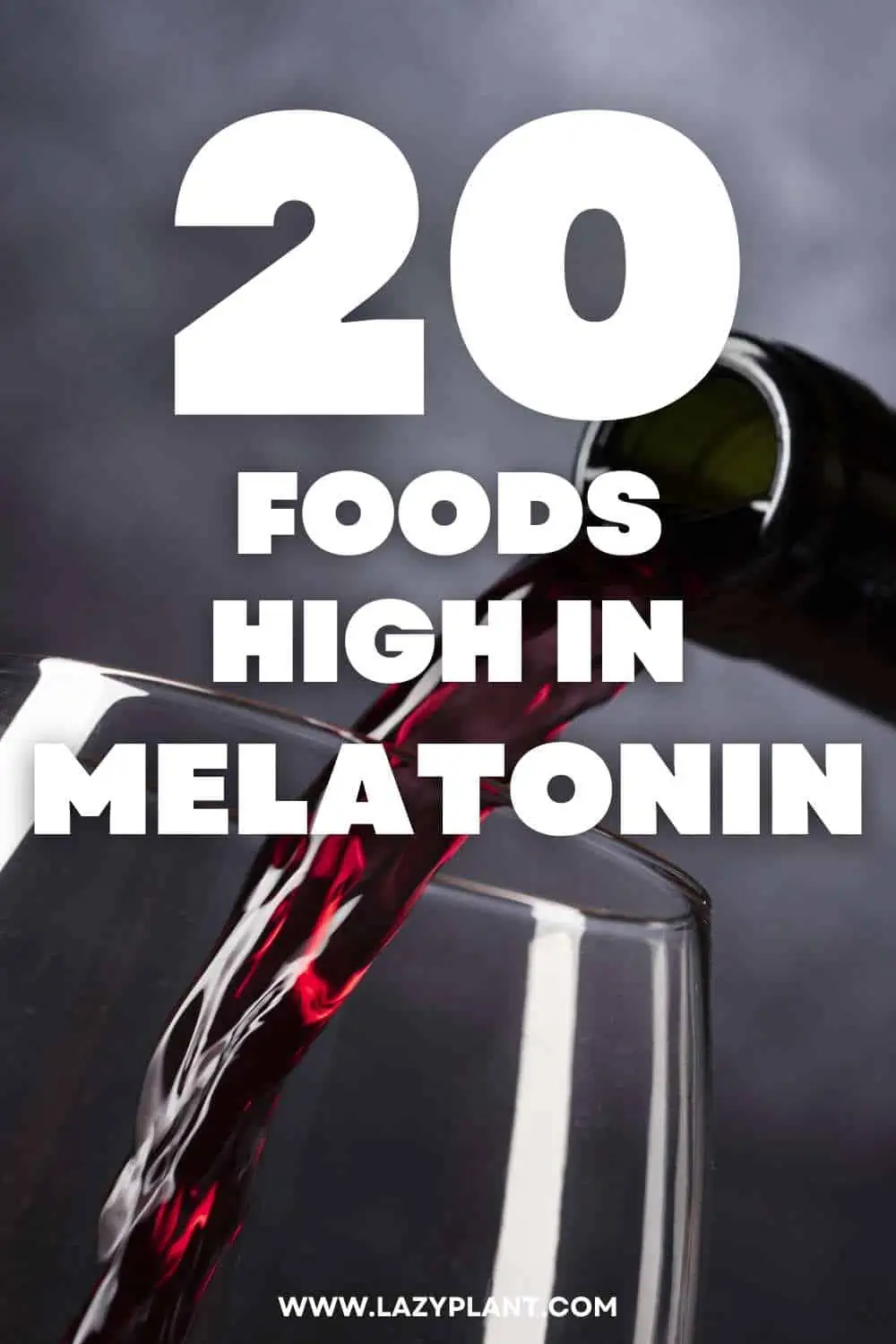You can naturally boost your daily melatonin intake by consuming common foods rich in melatonin, such as cranberries, pistachios, almonds, apples, cherries, strawberries, as well as drinking Merlot wine.
What is Melatonin?
Melatonin is a hormone that the human body naturally produces. We can also get melatonin from food or dietary supplements.
Above all, melatonin regulates sleep. It’s the internal clock of the human body. Actually, melatonin levels rise before bedtime and remain high during the night. Eating foods high in melatonin before bed or at dinner may help you sleep better at night.
Also, melatonin is a powerful antioxidant and has many health benefits. Melatonin has antioxidant, anti-inflammatory, anti-diabetic, and anticancer activity. In addition, it boosts the immune system, protects the cardiovascular system, improves athletic performance, and promotes weight loss.[1]
How Much Melatonin Does The Human Body Naturally Produce?
Each person can produce different amounts of melatonin a day. It depends on many factors:
- melatonin production decreases with aging.
- being overweight may be bad for melatonin production.
- light exposure at night inhibits melatonin synthesis. Especially exposure to blue light.
The human body can naturally produce about 10–80 mcg of melatonin per night. On the other hand, it doesn’t produce any significant amounts of melatonin in the daytime.[2]
Furthermore, the human body doesn’t store melatonin. It is instantly released into the blood. Excess melatonin is excreted through urine. Therefore, getting high doses from supplements is safe for healthy people.
What’s the maximum dose of melatonin I can safely take a day?
Most people can safely consume pretty high doses of melatonin from supplements. In fact, melatonin toxicity is rather unlikely.
But, pregnant, and breastfeeding women should avoid the consumption of melatonin supplements. There is insufficient evidence of safety.
Also, people with certain diseases, such as impaired liver functioning, should avoid receiving high doses of melatonin from supplements. They’ve decreased ability to metabolize melatonin.
People with autoimmune diseases such as rheumatoid arthritis should avoid melatonin supplements as well. Melatonin may cause adverse effects, as it stimulates the function of the immune system!
Certainly, consuming high doses of melatonin from supplements has a low risk of side effects. But, in some cases, extremely high doses of melatonin from supplements may cause mild side effects, such as daytime sleepiness, drowsiness, headache, nausea, dizziness, or rash.[3]
Most dietary supplements have a melatonin dose between 1 and 10 mg per serving. These doses are considered pretty safe for healthy people. As there hasn’t been established a maximum safe dose of melatonin, most people could safely take much higher doses!
Eating foods or drinking beverages high in melatonin won’t exceed the maximum safe dose of melatonin, or cause any adverse effects. Even the richest food or beverage in melatonin doesn’t provide more than 1 mg of melatonin per serving.
Pistachios are packed with Melatonin
Many nuts and seeds are good dietary sources of melatonin.
To begin with, pistachios are among the richest foods in melatonin, containing 23.3 mcg of melatonin per 100g or 6.5 mcg per 1oz.
Actually, pistachios are the best snack before bed for a good night’s sleep. A handful of pistachios before bedtime may help people with insomnia or jet lag.

Melatonin in Walnuts & Almonds
Nuts are plant-based foods with the highest melatonin content. Besides pistachios, walnuts and almonds are also good sources of melatonin. Almonds have 3.9 mcg, while walnuts have 0.35 mcg of melatonin per 100g.
Therefore, nuts, such as almonds and walnuts, are a great night snack. They could help you sleep at night or improve sleep quality.
Fruits with the highest Melatonin Content
Most fruits are poor in melatonin. Only cranberries, grapes, strawberries, cherries, apples, and bananas have decent amounts of melatonin.
Cranberries are the richest common food in melatonin
Cranberries are particularly high in melatonin. They contain between 250-960 mcg of melatonin per 100g! Actually, cranberry is the richest fruit in melatonin! So, eating cranberries or drinking cranberry juice before bed might improve sleep quality and duration.[3]
Banana is a melatonin-rich fruit
Banana is another common melatonin-rich fruit. It contains 0.07 mcg of melatonin per 100g. A whole banana has about 0.09 mcg of melatonin.
Most noteworthy, banana consumption can increase the concentration of melatonin in the body. According to a study, eating banana increased the melatonin concentration in the body by about 330%. Drinking orange or pineapple juice had the same effect. Pineapple juice increased the melatonin concentration about 200%. Orange juice increased the melatonin concentration by about 280%.[4]
How much melatonin is in cherries, strawberries & grapes?
Besides bananas, there are many other favorite fruits naturally rich in melatonin:
- Cherries are among the richest fruits in melatonin. They contain about 1.34 mcg of melatonin per 100g.
- Strawberries are also plant-based foods high in melatonin. They contain about 1.12 mcg of melatonin per 100g.
- Grapes are among the highest melatonin-containing fruits as well. The melatonin content of each grape variety varies greatly. Most grape varieties have about 0.1 mcg of melatonin per 100g. But, certain grape varieties contain more than 15 mcg per 100g.
- Grape juice is also rich in melatonin. It contains about 0.05 mcg of melatonin per 100 mL.
- Orange juice has about 0.3-2.2 mcg of melatonin per 100 mL. The melatonin content depends on the orange variety.
- Pineapples are great dietary sources of melatonin as well. Pineapples have about 0.03 mcg of melatonin per 100g.
Hence, a fruit salad with these fruits before bed could improve sleep quality.
Apples are good dietary sources of melatonin
Apple is another common fruit rich in melatonin. Depending on the variety, apple has between 0.7 and 6.7 mcg of melatonin per 100g.[5]

The peel of an apple is much higher in melatonin than the pulp. For instance, the “Granny Smith” variety has 10 times more melatonin in the peel than the pulp or the juice!
So, eating these a cup of fruit salad with melatonin-rich fruits in the evening may help you sleep better at night.
How much Melatonin is in Cereals?
Most cereals are great dietary sources of melatonin:
- corn is particularly rich in melatonin. The mean melatonin content of corn is 9.6 mcg per 100g. The melatonin concentrations of corn depend on the variety, though. There are corn varieties that contain more than 200 mcg of melatonin per 100g!
- rice is another cereal high in melatonin. The mean melatonin content of rice is 1.6 mcg per 100g. There are rice varieties with 26.4 mcg of melatonin per 100g!
- wheat is also naturally high in melatonin, with 12.5 mcg of melatonin per 100g.
- barley is also a good source of melatonin, with 8.2 mcg of melatonin per 100g.
- oats are good sources of melatonin as well. They contain approximately 9.1 mcg of melatonin per 100g.
As a rule of thumb, the crumb of bread is richer in melatonin than the crust.
Therefore, eating corn, rice, wheat, barley, or oatmeal can help you sleep better at night. Moreover, oats, wheat, barley, and rice are also great dietary sources of GABA. GABA is a chemical which also helps us sleep better at night.
Vegetables are Melatonin-rich Foods
Actually, only a few vegetables contain melatonin.
- peppers have about 1.2 mcg of melatonin per 100g, whereas dried peppers contain about 9.3 mcg of melatonin per 100g.
- tomatoes are also good sources of melatonin. Fresh tomatoes have about 1.4 mcg of melatonin per 100g. Dried tomatoes have about 25 mcg of melatonin per 100g.
- mushrooms are particularly rich in melatonin as well. Especially, certain mushroom varieties, such as Basidiomycota and Agaricus bisporus. These varieties contain up to 1,290 mcg and 640 mcg of melatonin per 100g, respectively. The melatonin content of mushrooms varies greatly, though. It depends on the mushroom variety, cultivation practices, and light conditions.
In addition, vegetables and other melatonin-containing foods could help the human body naturally produce more melatonin.
Which Beans are high in Melatonin?
Beans and legumes contain small amounts of melatonin. Only sprouted lentils are high in melatonin. They have about 100 mcg of melatonin per 100g! Actually, lentils are great for dinner. They could help us lose weight and sleep better at night.
Microgreens & Sprouts are great Dietary Sources
Microgreens and sprouts have amazing health benefits and a superior nutritional value as compared to seeds. The germination process increases the melatonin concentrations of seeds.
For instance, the melatonin content in germinated soybean seeds can be increased by up to 400%. Moreover, the melatonin content in germinated mung beans can be increased more than 11 times![1]
What Beverages Contain Melatonin?
Beer has negligible amounts of melatonin. It contains only 0.01 mcg of melatonin per 100 mL. But, as someone probably drinks more than 100 mL of beer a day, beer can help us meet our daily needs.
Additionally, most wine cultivars have about 12 mcg of melatonin per 100 mL. It greatly depends on the grape variety, though. Merlot, Malbec, and Sangiovese are the richest varieties of melatonin. Most noteworthy, Merlot has the richest melatonin content of all fruits. It has between 10,000 and 15,000 mcg of melatonin per 100g![3]

Thus, a glass of wine before bed could help you sleep at night.
Surprisingly, coffee is pretty rich in melatonin as well. Coffee beans are among the best melatonin-containing foods. For instance, roasted arabica coffee beans contain up to 960 mcg of melatonin per 100g. A cup of coffee contains up to 40 mcg of melatonin.
Certainly, drinking a cup of coffee before bed isn’t a good idea. Caffeine in coffee reduces the body’s ability to naturally produce melatonin. So, better prefer decaffeinated coffee at night.[2]
Do I need melatonin supplements?
Actually, most people will never experience melatonin deficiency.
First, melatonin supplements contain high doses. Much higher doses than the human body can produce or naturally present in food.
Most melatonin supplements contain melatonin doses of 3-5 mg per tablet. This dosage can be 60 times higher than our bodies can naturally synthesize per night. But, melatonin supplementation is the easiest way to boost your daily melatonin intake.
You better prefer supplements with the minimum dose of 1 mg (1,000 mcg), though. This dose is more than enough for most healthy people.
You’ll find a wide variety of melatonin supplements on iHerb.
Sign up for our newsletter (▼below) for a 5% off coupon on all your orders!
Always consult your healthcare provider before taking any dietary supplement.
Can Melatonin help you Lose Weight?
Taking melatonin supplements may help you lose weight. Especially, if you’re deficient in melatonin. The body synthesizes less melatonin as we age, or if we are exposed to light at night!
Low levels of melatonin may lead to insulin resistance, glucose intolerance, low-quality sleep, and obesity.[6]
First, melatonin supports weight loss because it’s important for the proper synthesis, and action of insulin!
Furthermore, melatonin supplementation may be beneficial for the secretion of leptin. Leptin is a hormone that helps regulate energy balance and inhibit hunger.
Also, melatonin supplementation is beneficial during a hypocaloric diet for weight loss, as it seems to regulate glucose levels, regulate appetite, and lower LDL-cholesterol and triglycerides in obese people.[7]
Most noteworthy, increased melatonin intake is beneficial for weight loss, as it seems to increase brown adipose tissue! Increased brown adipose tissue leads to higher energy expenditure. Brown fat is only a tiny percentage of the total fat of the human body. Brown fat is responsible for thermogenesis.[8]
A daily melatonin intake of 3 mg for 3 months can increase the volume of brown fat tissue in people with melatonin deficiency.[9]
Brown fat has a huge impact on obesity. Scientists believe that it may be a powerful therapy for obesity and diabetes! Most noteworthy, increased brown fat tissue could prevent gaining weight back![10]
Furthermore, increased brown fat is key for insulin sensitivity. Therefore, it’s beneficial for preventing insulin resistance, which plays an important role in obesity and diabetes.[11]
Thus, high doses of melatonin from supplements may increase basal metabolism in people with low levels of melatonin!
Melatonin for a Lean Body
Melatonin has beneficial effects on tissue repair and recovery from intense exercise.[12]
Athletes with high melatonin concentrations have less severe muscle inflammation, and oxidative stress scores resulting from exhaustive exercise.
Melatonin can enhance exercise tolerance! It increases muscle glycogen 3 hours after exhaustive exercise, providing a better cellular metabolic environment for future efforts. Fast muscle glycogen replenishment after strenuous exercise is key for muscle recovery and improved athletic performance. It provides a greater tolerance to physical exercise.[13]
Intense exercise disturb the antioxidant status of athletes. However, high melatonin intake strengthens the antioxidant status of trained athletes in various sports.[14]
Melatonin is a key antioxidant compound that may neutralize the negative effects of exhaustive high-intense physical exercise, improving athletic performance.
It speeds up recovery in many ways. Among others, it lowers the proinflammatory cytokines, lipid peroxides, C-reactive protein, and reactive oxygen species, which can be strongly elevated in athletes who work out to exhaustion.
Additionally, melatonin has beneficial effects on athletes because it plays a key role in glucose homeostasis and lipid metabolism regulation. It promotes a healthy metabolic rate!
Also, it helps speed up muscle healing after injury. A balance between muscle injury and regeneration is critical for athletes.[15]
Melatonin secretion is limited during aerobic exercise but it’s enhanced during high-intensity interval exercise!